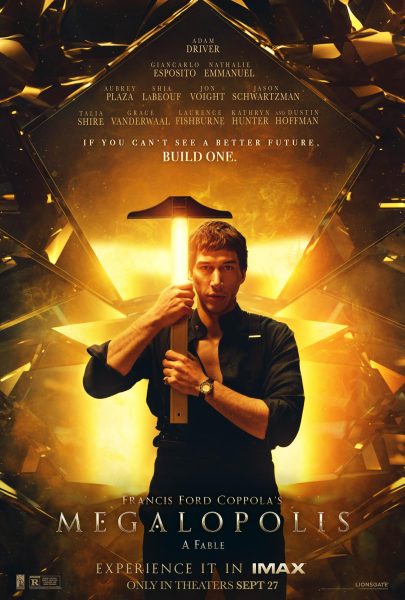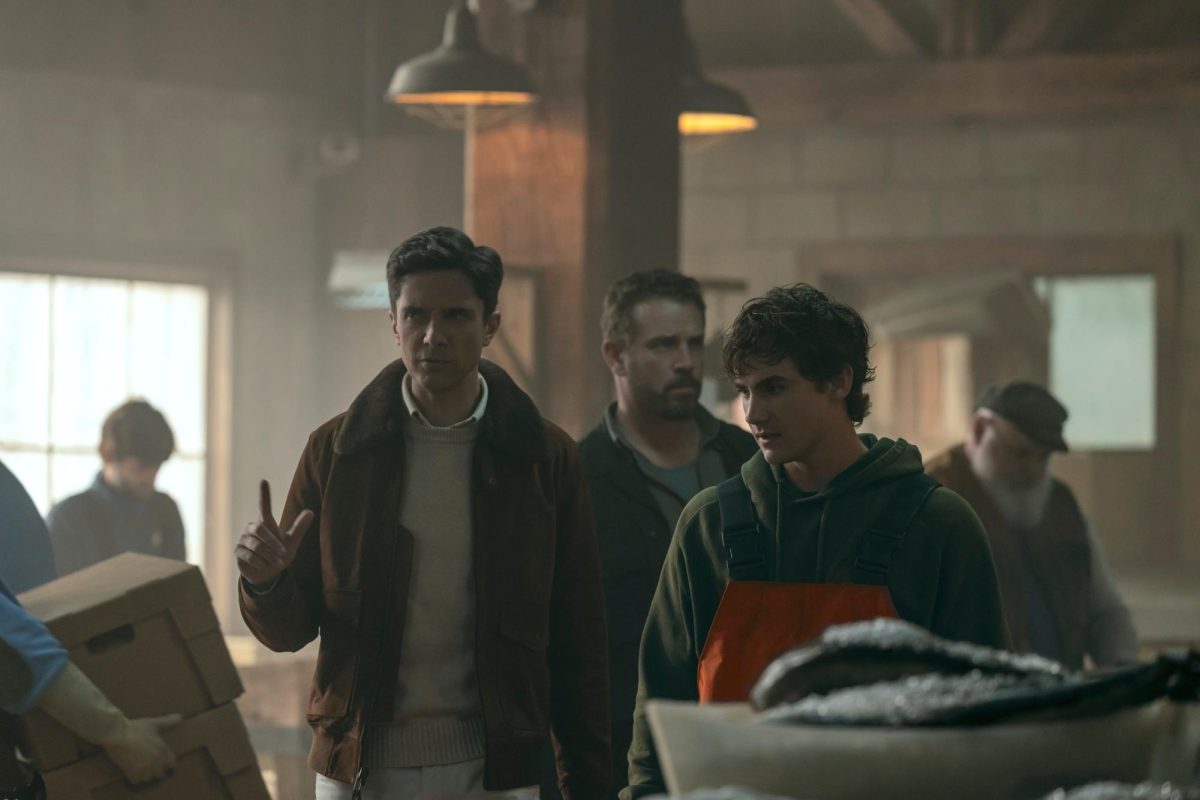
Few creatives in Hollywood need less of an introduction than Francis Ford Coppola. The man has created absolute masterpieces of cinema, from the “Godfather” trilogy and “Apocalypse Now” to “The Conversation” and “Bram Stoker’s Dracula” and plenty more. Coppola is a man who is very much revered in the eyes of cinephiles. In the late 1970s and early 1980s, Coppola had an idea for an absolute mammoth of a feature: a science-fiction epic known simply as “Megalopolis.” The idea came and went in the decades that followed, seemingly being killed for good after the Sept. 11 attacks (which bore a striking resemblance to the film’s plot), before Coppola finally revived the project in 2019, selling his winery to self-produce the film for $120 million.
Almost immediately, the problems began for the acclaimed filmmaker, even ignoring the fact he had not made a film since 2011’s “Twixt.” Several members of its massive ensemble cast were considered controversial and “canceled,” including Shia LaBeouf, Jon Voight and Dustin Hoffman. Filming was delayed due to the global pandemic, and Coppola himself was accused of sexually abusing female extras on-set. Absolutely no studio was willing to acquire the film for distribution until Lionsgate stepped in at the last minute on the condition that Coppola paid for marketing, and the film premiered to ferociously polarizing reactions at Cannes Film Festival, as well as reports that the film featured a hellacious fourth-wall breaking moment between one of the characters and an actual audience member. The film’s official trailer was criticized for having fabricated, artificial intelligence (AI) generated quotes of negative reviews of previous Coppola films before being taken down. It soon became a historic bomb at the box office, not helped by a series of other high-profile bombs from Lionsgate over the summer, the list goes on and on.
All of this is to say that the road to “Megalopolis” has been a near unparalleled disaster, facing challenges at every corner. But now that it has finally been released after over 40 years, was the insurmountable wait worth it?
“Megalopolis” is a film with a seemingly straightforward plot that becomes insatiably confused and overly complicated in its execution. The film follows Cesar Catalina (Adam Driver), a cold and haughty architect in a city that looks as if New York was modeled after the Roman Empire (helpfully titled “New Rome”), who has the ability to freeze time at will. As New Rome begins to deteriorate, Cesar hopes to use a mysterious substance he discovered known as “Megalon” to create a utopian city called “Megalopolis,” which faces opposition from the newly-elected mayor Franklyn Cicero (Giancarlo Esposito), who wants the city to stay the way it is.
Realistically, that should be the plot of the film, but Coppola goes a step beyond and throws in a dizzying amount of sub-plots and supporting characters to the nearly 2 1/2 hour runtime. Examples of such include eccentric reporter and Cesar’s mistress, Wow Platinum (Aubrey Plaza), desiring power at every turn, and Cesar’s wealthy uncle Hamilton Crassus III (Voight) falling for Platinum while trying to support Cesar in his endeavors. As well as Cesar’s sleazy cousin Clodio (LaBeouf) trying to sabotage Cesar for his own agenda, a scandal surrounding popular artist Vesta Sweetwater (Grace VanderWaal) and Cicero’s daughter Julia (Nathalie Emmanuel) having to decide between Cesar or her father as she tries to shape her own future in this spiraling, chaotic mess of a city and, by extension, film.
There is no easy way to say it, “Megalopolis” is many things, but not “good.” The film feels both agonizingly slow and blisteringly quick in terms of pacing, either staying in one place forever or constantly switching between characters and events. Add an absolute lack of cohesion or flow, and even if you are not put to sleep by its more narcoleptic moments, you will be completely lost by what goes down in this film. This comes down to Coppola’s direction, which is totally scattershot and bizarre. Things just… happen in this film, with little rhyme or reason, and it begs countless questions from the audience. How exactly can Cesar stop time by literally saying “Time stop?” Why is there a bizarre scandal about deep fake pornography that is settled within five minutes? Why does Cicero’s assistant (Jason Schwartzman) just start playing drums out of nowhere in one scene? Why does the whole film set up, as Cesar puts it, “a great debate about the future” that ultimately never happens?
Not helping the direction is Coppola’s script, which comes off like the ramblings of a madman or a crazed experimental film most of the time. In addition, it is chock full of cringe-inducing or bizarre dialogue. From Wow Platinum telling Cesar “He is anal as hell, while she is oral as hell,” to Cicero’s fixer Nush Berman (Hoffman) yelling “Concrete!” and “Steel!” repeatedly, to Cesar reciting the entire unabridged “To be, or not to be?” soliloquy in that same scene, the screenplay for “Megalopolis” just comes off as too weird for its own good, especially for someone who has not created something in so long like Coppola has.
At the very least, all of this embarrassing and stilted dialogue would be somewhat tolerable if the massive ensemble delivered, but they don’t. . Driver is either awkward and flat or hilariously overacting as Cesar, the aforementioned canceled actors in LaBeouf, Voight and Hoffman are ridiculous ignoring their controversies and distracting with them, Plaza is the definition of over-the-top as the sultry Platinum, supporting actresses Talia Shire (as Cesar’s mother Constance) and Kathryn Hunter (as Cicero’s wife Teresa) are largely unimpressive, Laurence Fishburne as Cesar’s assistant Fundi Romaine, who also narrates the film, is completely flat and wasted, and even actors who are not doing too terribly like Esposito, Emmanuel and Schwartzman have simply given better performances in other media. Similarly to the film itself, the acting in “Megalopolis” is all over the place, incoherent and almost embarrassing to witness.
Even with everything else going against “Megalopolis,” the one thing that would surely be a slam dunk, especially for a film with a staggering $120 million budget, would be the technical elements. After watching the film, I am quite honestly confused where that budget went to outside of the cast. The cinematography by Mihai Mălaimare Jr. is mostly milquetoast and average, like every shot was made to be put in the trailers or posts singling out “amazing” shots within it. In fact, outside of some laughably awful CGI and green screen (particularly in the third act), “milquetoast” is probably the best possible word to describe the tech of “Megalopolis.” The editing is flat, the production design is decent, but pure style over substance, the score by Osvaldo Golijov is entirely unspecial, the effects that don’t look laughable are strictly for the sake of showing pretty visuals, and so on. Even some of the worst films can manage to have decent or even good technical elements to them, so to see “Megalopolis” falter here as well is just sad.
Ever since I saw the film, I have had to ask myself a serious question: is Francis Ford Coppola’s “Megalopolis” the worst film of the year? Is it truly worse than films like “Borderlands” or “Madame Web,” where it was blatantly clear they would be trainwrecks from their inception and that very few put actual effort into them? Or is it a weird inverse, where the amount of genuine time, talent and care that went into making an absolute disaster of this caliber makes it worse than films that nobody expected to be good? Even now, I cannot in good faith answer that question, and I honestly might not be able to for a long time. “Megalopolis” is an unparalleled disaster, that is for absolute certainty, but it is a special kind of disaster. A misguided abomination that we do not see nearly as much these days. I may not be able to recommend this film to a single soul, but perhaps it is an experience that demands to be seen, if only to bear witness to how far the mighty have fallen.



















